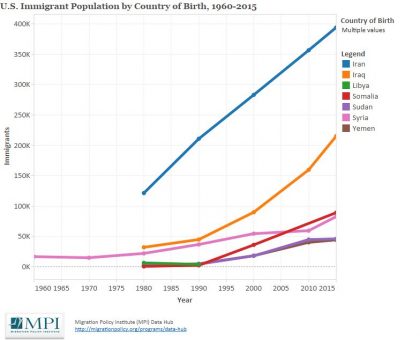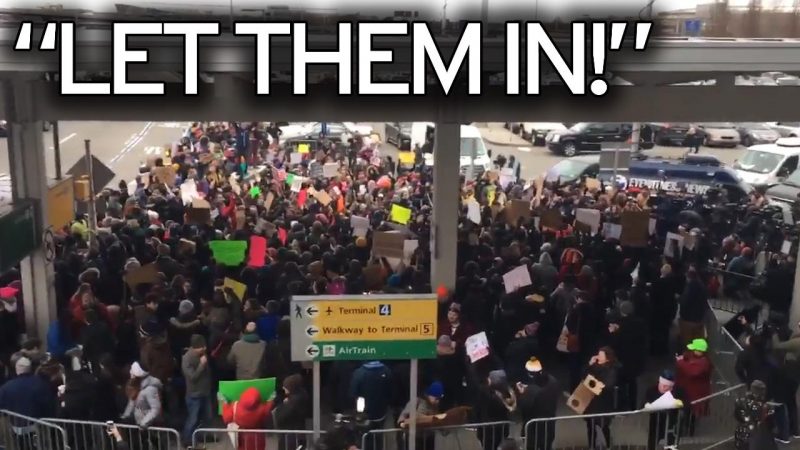U.S. residents with roots from Iran, Iraq, Libya, Somalia, Sudan, Syria, and Yemen AND visitors from those countries are in for uncertain and unwelcoming times in the United States of America.
Any Green Card holder living in the United States of America visiting any of the seven countries listed will be in for an unpleasant experience when arriving back in the U.S.
Those from any of the seven countries with valid U.S. Visas may just want to stamp them invalid.
Americans planning to visit Iran should change travel plans – they are no longer welcome in the Islamic Republic of Iran.
This is the result of an executive order put in place by U.S. President Donald Trump.
Thousands of protesters at U.S. airports around the country including New York, JFK, and Chicago came to voice their concerns. An 82-year-old lady having a valid US tourist visa from Iran, who suffers from diabetes, was detained at JFK airport after arriving from Tehran. Her son, a U.S. citizen born in Iran was in tears and disbelief, as he waited at the airport for his mother to be released.
Thousands of foreigners are being detained at U.S. airports at this time.
Protesting scenes at U.S. airports are peaceful, but protestors are determined to push the U.S. government to put clear guidelines into an executive order issued by the new president.
Protesters are demanding: “Let them in!”

A large share of the U.S. population is made up of immigrants: one in eight people (13% of the total population, 16% of all adults) was born abroad, according to the U.S. Census Bureau. But only a small fraction was born in countries affected by the temporary ban.
As of 2012, there were 781,235 residents of the U.S. who were born in countries affected by the ban – just 2% of all immigrants.
Most immigrated long ago. Census Bureau data analyzed by Pew Research Center reveals that a third of U.S. residents who immigrated from the Middle East did so before 1990.
Pew’s analysis also shows that many immigrants from the region now work in management (11%), healthcare (11%), or education (8%) – only 1% were unemployed as of 2012. Some have been able to become U.S. citizens; only half of all U.S. immigrants were naturalized as of 2012.
This is the executive order now put in place by the White House:
EXECUTIVE ORDER
PROTECTING THE NATION FROM FOREIGN TERRORIST ENTRY INTO THE UNITED STATES
By the authority vested in me as President by the Constitution and laws of the United States of America, including the Immigration and Nationality Act (INA), 8 U.S.C. 1101 et seq., and section 301 of title 3, United States Code, and to protect the American people from terrorist attacks by foreign nationals admitted to the United States, it is hereby ordered as follows:
Section 1. Purpose. The visa-issuance process plays a crucial role in detecting individuals with terrorist ties and stopping them from entering the United States. Perhaps in no instance was that more apparent than the terrorist attacks of September 11, 2001, when State Department policy prevented consular officers from properly scrutinizing the visa applications of several of the 19 foreign nationals who went on to murder nearly 3,000 Americans. And while the visa-issuance process was reviewed and amended after the September 11 attacks to better detect would-be terrorists from receiving visas, these measures did not stop attacks by foreign nationals who were admitted to the United States.
Numerous foreign-born individuals have been convicted or implicated in terrorism-related crimes since September 11, 2001, including foreign nationals who entered the United States after receiving visitor, student, or employment visas, or who entered through the United States refugee resettlement program.Deteriorating conditions in certain countries due to war, strife, disaster, and civil unrest increase the likelihood that terrorists will use any means possible to enter the United States. The United States must be vigilant during the visa-issuance process to ensure that those approved for admission do not intend to harm Americans and that they have no ties to terrorism.
Sec. 2. Policy. It is the policy of the United States to protect its citizens from foreign nationals who intend to commit terrorist attacks in the United States; and to prevent the admission of foreign nationals who intend to exploit United States immigration laws for malevolent purposes.
Sec. 3. Suspension of Issuance of Visas and Other Immigration Benefits to Nationals of Countries of Particular Concern. (a) The Secretary of Homeland Security, in consultation with the Secretary of State and the Director of National Intelligence, shall immediately conduct a review to determine the information needed from any country to adjudicate any visa, admission, or other benefit under the INA (adjudications) in order to determine that the individual seeking the benefit is who the individual claims to be and is not a security or public-safety threat.
(b) The Secretary of Homeland Security, in consultation with the Secretary of State and the Director of National Intelligence, shall submit to the President a report on the results of the review described in subsection (a) of this section, including the Secretary of Homeland Security’s determination of the information needed for adjudications and a list of countries that do not provide adequate information, within 30 days of the date of this order. The Secretary of Homeland Security shall provide a copy of the report to the Secretary of State and the Director of National Intelligence.
(c) To temporarily reduce investigative burdens on relevant agencies during the review period described in subsection (a) of this section, to ensure the proper review and maximum utilization of available resources for the screening of foreign nationals, and to ensure that adequate standards are established to prevent infiltration by foreign terrorists or criminals, pursuant to section 212(f) of the INA, 8 U.S.C. 1182(f), I hereby proclaim that the immigrant and nonimmigrant entry into the United States of aliens from countries referred to in section 217(a)(12) of the INA, 8 U.S.C. 1187(a)(12), would be detrimental to the interests of the United States, and I hereby suspend entry into the United States, as immigrants and nonimmigrants, of such persons for 90 daysfrom the date of this order (excluding those foreign nationals traveling on diplomatic visas, North Atlantic Treaty Organization visas, C-2 visas for travel to the United Nations, and G-1, G-2, G-3, and G-4 visas).
(e) After the 60-day period described in subsection (d) of this section expires, the Secretary of Homeland Security, in consultation with the Secretary of State, shall submit to the President a list of countries recommended for inclusion on a Presidential proclamation that would prohibit the entry of foreign nationals (excluding those foreign nationals traveling on diplomatic visas, North Atlantic Treaty Organization visas, C-2 visas for travel to the United Nations, and G-1, G-2, G-3, and G-4 visas) from countries that do not provide the information requested pursuant to subsection (d) of this section until compliance occurs.
(f) At any point after submitting the list described in subsection (e) of this section, the Secretary of State or the Secretary of Homeland Security may submit to the President the names of any additional countries recommended for similar treatment.
(g) Notwithstanding a suspension pursuant to subsection (c) of this section or pursuant to a Presidential proclamation described in subsection (e) of this section, the Secretaries of State and Homeland Security may, on a case-by-case basis, and when in the national interest, issue visas or other immigration benefits to nationals of countries for which visas and benefits are otherwise blocked.
(h) The Secretaries of State and Homeland Security shall submit to the President a joint report on the progress in implementing this order within 30 days of the date of this order, a second report within 60 days of the date of this order, a third report within 90 days of the date of this order, and a fourth report within 120 days of the date of this order.
Sec. 4. Implementing Uniform Screening Standards for All Immigration Programs. (a) The Secretary of State, the Secretary of Homeland Security, the Director of National Intelligence, and the Director of the Federal Bureau of Investigation shall implement a program, as part of the adjudication process for immigration benefits, to identify individuals seeking to enter the United States on a fraudulent basis with the intent to cause harm, or who are at risk of causing harm subsequent to their admission. This program will include the development of a uniform screening standard and procedure, such as in-person interviews; a database of identity documents proffered by applicants to ensure that duplicate documents are not used by multiple applicants; amended application forms that include questions aimed at identifying fraudulent answers and malicious intent; a mechanism to ensure that the applicant is who the applicant claims to be; a process to evaluate the applicant’s likelihood of becoming a positively contributing member of society and the applicant’s ability to make contributions to the national interest; and a mechanism to assess whether or not the applicant has the intent to commit criminal or terrorist acts after entering the United States.




Leave a Comment